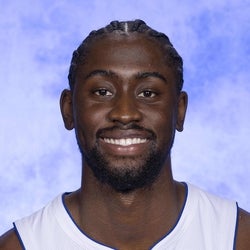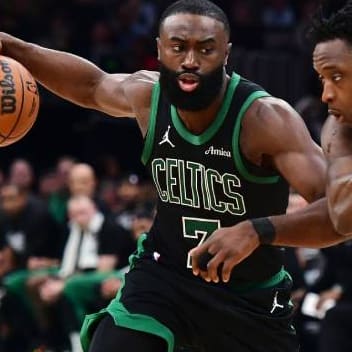Questionable
Injury Illness
Est. Return 1/29/2026
2025 Stats
PTS
7.9
REB
1.8
AST
2.8
STL
0.9
BLK
0.6
ROS Projections
2025 Fantasy Outlook
Cleveland traded LeVert to Atlanta at the deadline last season, and he was on the move again this offseason, signing a two-way deal in Detroit. Jaden Ivey is expected to be healthy and reclaim a starting spot, but the Pistons lost a lot of backcourt help this offseason, including Dennis Schroder, Malik Beasley and Tim Hardaway. With those guys out of the picture, LeVert will likely be the first guard off the bench behind Ivey and Cade Cunningham. Marcus Sasser is the Pistons' other ball-handling option, while newcomers Duncan Robinson and Chaz Lanier will try to replace Beasley and Hardaway's three-point shooting. Availability hasn't been LeVert's strong suit, as he's surpassed 70 regular-season appearances only twice in his nine-year career. He's also never been a primary starter, but last season was only the third time he made fewer than 25 starts, finishing with a career-low three. Despite operating as a reserve, LeVert has averaged at least 25 minutes per game in eight straight seasons. He has finished inside the top-160 players in eight category leagues in five consecutive campaigns, though he's cracked the Top 100 only once. LeVert has enough upside to be taken before pick 200, but he doesn't have to be taken before pick 150. Read Past Outlooks

Iffy for Thursday
LeVert (illness) is listed as questionable for Thursday's game against the Suns.
ANALYSIS
LeVert has missed Detroit's last four games due to an illness, though there's a chance he'll return Thursday. If the veteran guard remains sidelined, Daniss Jenkins and Marcus Sasser would be candidates for increased playing time.
LeVert has missed Detroit's last four games due to an illness, though there's a chance he'll return Thursday. If the veteran guard remains sidelined, Daniss Jenkins and Marcus Sasser would be candidates for increased playing time.
NBA Per Game Stats
Per Game
Total
Per 36
NBA Per Game Stats
Loading Per Game Stats...
2025 NBA Game Log
2025
2024
2023
2022
2021
2020
2019
2018
2017
2016
2025 NBA Per Game Split Stats
Schedule
By Month
Starting/Off Bench
Days Rest
Vs Opp
By Result
2025 NBA Per Game Split Stats
Loading Split Stats...
Advanced Stats
Loading Advanced Stats...
Stat Review
2025
2024
2023
2022
2021
2020
2019
2018
2017
2016
How does Caris LeVert compare to other players?
This section compares his stats with all players from the previous three seasons (minimum 200 minutes played)*. The bar represents the player's percentile rank. For example, if the bar is halfway across, then the player falls into the 50th percentile for that stat and it would be considered average.
True Shooting %
54.1%
Effective Field Goal %
51.5%
3-Point Attempt Rate
49.0%
Free Throw Rate
26.0%
Offensive Rebound %
1.5%
Defensive Rebound %
8.6%
Total Rebound %
5.1%
Assist %
19.2%
Steal %
1.9%
Block %
3.2%
Turnover %
12.2%
Usage %
18.2%
Fantasy Points Per Game
17.6
Fantasy Points Per Minute
0.9
NBA Historical Fantasy Stats
Historical ADP
Loading Historical ADP...
Pistons Depth Chart
Our full team depth charts are reserved for RotoWire subscribers.
Subscribe Now
Pistons Rotation: Minutes Breakdown
Loading Pistons Rotation Data...
Average Fantasy Points
Minutes
FanDuel
DraftKings
Yahoo
FantasyDraft
Head2Head
Sorare
Average Fantasy Points are determined when Caris LeVert was active vs. non-active during the season. Click here to view average fantasy points for a different time period.
Loading Average Minutes...
Past Fantasy Outlooks
2024
2023
2022
2021
2020
2019
2018
2017
2016
Despite pockets of strong production throughout the 2023-24 season, LeVert once again struggled to deliver consistent fantasy value. Typically coming off the bench behind Donovan Mitchell and Darius Garland, LeVert provides the Cavaliers with a reliable on-court piece, who can step up when either starter is ruled out. He was the 128th-ranked player in nine-category leagues, compiling averages of 14.0 points, 4.1 rebounds, 5.1 assists, 1.1 steals and 1.6 three-pointers. While on the surface, this makes him a must-roster player, anyone who understands fantasy knows that this is not the case. Poor percentages and an inability to produce at a high level when coming off the bench make him more of an elite streaming option if and when the Cavaliers' backcourt depth is challenged. With all key pieces returning to Cleveland this season, LeVert is likely to resume this role, meaning managers do not have to go out of their way to secure him in drafts. The preferred strategy is to add him to a waitlist, picking him up when the time is right.
More Fantasy News

Out again Tuesday
LeVert (illness) will not play Tuesday against the Nuggets.
ANALYSIS
Subscribe now to instantly reveal our take on this news.
Subscribe now to instantly reveal our take on this news.

Not playing Sunday
LeVert (illness) has been ruled out for Sunday's game against the Kings.
ANALYSIS
Subscribe now to instantly reveal our take on this news.
Subscribe now to instantly reveal our take on this news.

Doubtful to play Sunday
LeVert (illness) is doubtful for Sunday's game against the Kings.
ANALYSIS
Subscribe now to instantly reveal our take on this news.
Subscribe now to instantly reveal our take on this news.

Ruled out Friday
LeVert (illness) will not play Friday against the Rockets.
ANALYSIS
Subscribe now to instantly reveal our take on this news.
Subscribe now to instantly reveal our take on this news.

Doubtful for Friday
LeVert (illness) is doubtful to play Friday versus Houston.
ANALYSIS
Subscribe now to instantly reveal our take on this news.
Subscribe now to instantly reveal our take on this news.
Latest Fantasy Rumors

Excited to play under Bickerstaff
LeVert said Sunday that he's excited to play under coach J.B. Bickerstaff again, Hunter Pattinson of The Athletic reports.
ANALYSIS
"J.B. brought out a different part of my game, and I've always said that. Once I went to Cleveland, I was asked to play defense," LeVert said. "Before then, I wasn't really asked to play defense, and I think that's one of the stronger parts of my game now. Those things really helped me take my game to the next level." The familiarity between LeVert and Bickerstaff could help him hit the ground running in Detroit. With the Pistons losing Tim Hardaway and Malik Beasley, LeVert has a wide path to minutes on his new team, along with another free agent addition in Duncan Robinson.
"J.B. brought out a different part of my game, and I've always said that. Once I went to Cleveland, I was asked to play defense," LeVert said. "Before then, I wasn't really asked to play defense, and I think that's one of the stronger parts of my game now. Those things really helped me take my game to the next level." The familiarity between LeVert and Bickerstaff could help him hit the ground running in Detroit. With the Pistons losing Tim Hardaway and Malik Beasley, LeVert has a wide path to minutes on his new team, along with another free agent addition in Duncan Robinson.














